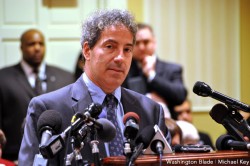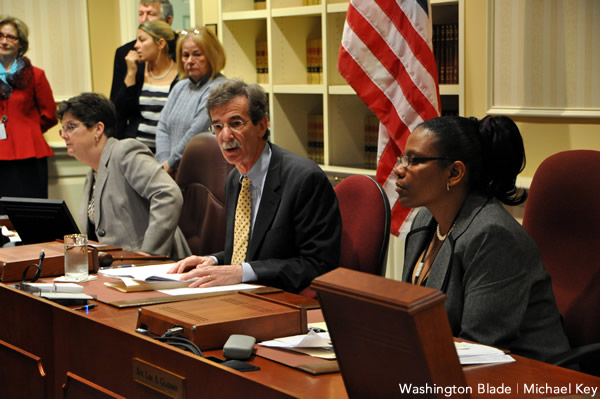Local
Md. Senate hearing on marriage draws hundreds
Governor, Baltimore mayor testify in favor of bill
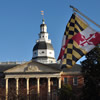
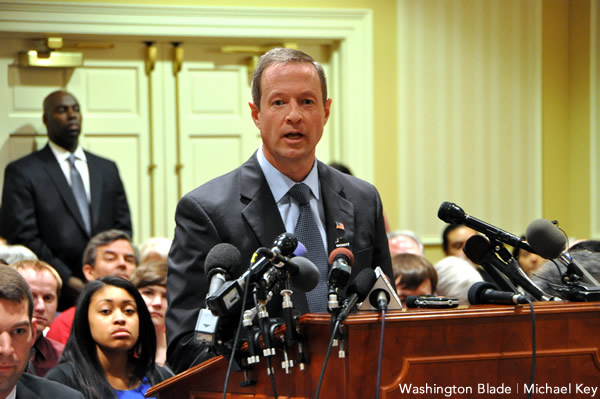
Gov. Martin O'Malley testifies before the Senate Judicial Proceedings Committee Tuesday in favor of the Civil Marriage Protection Act. (Washington Blade photo by Michael Key)
ANNAPOLIS, Md. — Over the course of four hours on Tuesday, opponents and supporters of same-sex marriage delivered compelling testimony before a Maryland Senate committee in hopes of swaying lawmakers on a landmark bill.
The Maryland Senate Judicial Proceedings Committee heard testimony on the Civil Marriage Protection Act throughout the afternoon on the last day of January, as lawmakers, experts, clergy and regular citizens from both sides of the issue shared their feelings on the bill at two minutes a piece.
Gaithersburg resident Stephanie Kreps arrived early to the hearing, proudly wearing a ‘Marylanders for Marriage Equality’ sticker to show her support for the bill as the mother of a gay son.
“It’s simple to me,” Kreps told the Blade. “I have rights that my gay son doesn’t have, and I want those rights for him and all other gay people.”
Kreps was looking forward to hearing the testimony of the bill’s supporters and said she was hopeful for the bill’s prospects considering the Governor’s support this year, and the growing trend toward supporting marriage for same-sex couples in Maryland.
The first witness to testify in favor of the bill was Maryland Gov. Martin O’Malley, who has made the bill part of his 2012 legislative agenda. O’Malley, who had at one time hesitated to support extending full marriage rights to gay couples, has become a proponent of the legislation.
“As you know we already recognize civil marriages that come from other states,” Gov. O’Malley said during his brief testimony, “the civil marriage equality bill draws upon the lessons that we have learned from these other states.”
“This bill balances an individual’s civil marriage rights with the important protections of religious freedoms for all,” O’Malley continued. “And because it protects both of these inalienable rights, it is supported by a broad coalition of Marylanders, which includes clergy, community leaders, faith-based organizations, civil rights groups and those who hold the most important title of all in our democracy, and that title is citizen.”
O’Malley was followed by gay Sen. Richard Madaleno who spoke from the heart about his love for his partner and raising a child, and relayed a story about a walk with his young daughter that expressed the very essence of family.
“We were picking flowers along the way, and she was picking buttercups and dandelions,” Madaleno said. “As she picked a few of the flowers, and went on to pick more, she handed me a little bouquet, and said ‘daddy will you hold my wishes for me?’” When he asked her what she meant, she explained. “She said ‘This is a wishing flower, you blow on it, and you see where your wishes go.’”
“I don’t know why people fall in love, I don’t know exactly why I have fallen in love with Mark as opposed to someone else, but I have, and together we have formed a family, and that family includes children.”
Following Madaleno were Democratic Sens. Jamie Raskin and Robert Garagiola and Republican Sen. Allan Kittleman, as well as Attorney General Douglas Gansler (video below courtesy GoodAsYou), all of whom urged passage of the bill.
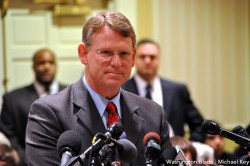
Sen. Kittleman broke ranks with Republicans to support the bill. (Washington Blade photo by Michael Key)
Kittleman, who spoke about his father’s work in the civil rights movement, said he feels so strongly about the legislation because “I really do believe it’s about family, it’s about liberty, it’s about equality.”
“I remember my dad telling me years later that when he was fighting for the civil rights movement, and integration in the public schools in Howard County, and he was talking to people who were opposed to it, especially school board members, the would say things like ‘but you don’t know what will happen if we accept African Americans. Here’s what might happen. They’re going to do this in the hallway,’ or ‘they’ll do this in the classroom,’ or ‘they’ll cause this problem.’ Always ‘might be this’ or ‘might be that.’ What I’m urging you is don’t succumb to the mights. What my father taught me is that you don’t take away someone’s civil rights because of something that might happen. You can deal with the ‘mights’ later on. But make sure we get the civil rights done now. Make sure we get that equality for everyone in our community now.”
“You don’t say no to civil rights because you’re worried about what might happen in the future,” Kittleman concluded.
Raskin, for his part, strongly defended the religious protections in the bill, confirming that churches and church sponsored and operated facilities would be exempt from having to “lend any of its accommodations, programs, or services for the purpose of promoting a marriage it disapproves of for religious reasons.”
However, Raskin was quick to differentiate religious groups and private individuals or businesses, who have been barred in law since 2001 from discriminating against Marylanders in public accommodation because of sexual orientation.
http://www.youtube.com/watch?v=z0aThYUXJ64
Sen. Raskin defends the marriage bill.
Also testifying in favor of the bill was Baltimore Mayor Stephanie Rawlings-Blake.
“I believe that all couples regardless of their sexual orientation, want their children protected under the law,” Rawlings-Blake testified. “Please don’t be mistaken, this bill is about more than those rights, it’s also about civil rights and about equality under the law.”
Both sides were given two hours each to present their witnesses in four parts — the first and third hours in support of the law, and the second and fourth in opposition.
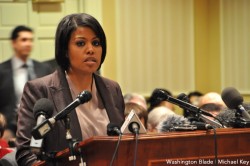
Baltimore mayor Stephanie Rawlings-Blake testifies in favor of the bill. (Washington Blade photo by Michael Key
All told, more than 75 citizens delivered testimony both for and against the bill over a period of four and a half hours. Opposition to the bill ran from the colorful — like local same-sex marriage hearing mainstay Minister Leroy Swailes, who produced groans even from other opponents of the bill — to the passionate; while support ran from the clinically factual to the deeply moving — such as the ardently supportive mother of a lesbian daughter, Penny Nichols.
The supporters also included dozens of same-sex couples raising children, parents of gay children and straight children raised by same-sex couples, all in an attempt to counter arguments by the opposition that same-sex marriage would be detrimental to the development of children in Maryland.
Also testifying in support of the law in the first hour were gay veteran and law enforcement officer Irene Huskens of Fort Washington; president of the Maryland AFL-CIO union, and father of a gay child, Fred Mason; gay federal worker and long-time Maryland resident Candy Holmes; supportive Unitarian-Universalist minister Rev. John Crestwell; and David Rocah, staff attorney at the ACLU of Maryland.
One of the questions that Rocah fielded from committee member Sen. Joseph M. Getty after his testimony dealt with whether the law discriminates against close family members that wish to marry “because of genetics, and the familial relationship is because of genetic relationships.”
“It’s long-standing policy in Maryland to prohibit marriage between people of a particular familial relation,” Rocah answered. “They don’t all relate with genetics. Maryland has prohibited relationships between stepfathers or stepmothers, they’re not genetically related. Different states have different degrees of familial relationships in which marriage is prohibited. I don’t see the issue of discrimination that you’re referring to.”
Both the hearing room itself and an overflow room were filled to capacity through much of the hearing, producing an electric and anxious atmosphere among those in attendance. Same-sex marriage supporters sat next to opponents, making it difficult in many cases to distinguish who was there in favor of and who was there against. Most in attendance could only be differentiated by the round stickers given out by both the proponents and opponents — which themselves were similar in shape, size and coloring.
Among those in the audience in opposition to the bill was Maryland resident Ruby Wilson who says she has concerns about the bill because she believes it will harm children.
“I believe children are being affected already in Massachusetts with the bill that’s there,” Wilson — who says as a Catholic she does not believe gays should adopt children — told the Blade. “In the fifth grade they’re given a book …and it tells all the ways that you can enjoy yourself as a homosexual. I don’t want my grandchildren to have that.”
“Also they said that there’s going to be a conscience clause in this bill for Christians,” Wilson continued. “Well, they just take that to court, and the courts just take it out. And then where are we at? We just have no protection.”
“I’m totally against it,” Wilson said, though she is not opposed to civil unions for same-sex couples. “I’m just opposed to redefining marriage.”
Wilson’s feelings about “redefining marriage” were echoed by Maryland resident Edna Kersey.
“I think that traditionally that is what marriage defines, is a man and a woman, and I feel that they should find another term for the same-sex marriage, or the same-sex union, so that it not tamper with the name that we so long stood on,” Kersey told the Blade. “That’s what our foundation is built on, the tradition marriage, which is between a man and a woman. So its not the union itself, it is the name or the title that they are trying to change.”
However, Kersey tells the Blade that she is not in support of Civil Unions, unlike Wilson.
In the second hour, the opposition first presented Maryland Family Alliance president Pastor Dereck McCoy, who set a cordial, respectful tone.
“Regardless of the tenuous debate that we’re in,” McCoy said, “I think we need to understand that Marylanders are separated on this issue, but it’s a deep and passionate thing in the root and the heart of the communities and many people’s lives.”
However, regardless of the result of the vote, McCoy said the definition of marriage would not change for opponents. “People will still feel that marriage should be defined as one man, and one woman. That does not change.”
Following McCoy was Maryland Baptist ministers Rev. Dr. John Lund, and Rev. Dr. Nate Thomas, as well as Presbyterian pastor Bob Borger, former mega-church pastor Joel Peebles — who recently lost a court battle over control over his Jericho City of Praise Ministry — as well as some Catholic voices such as Pastor of Our Lady of Perpetual Help, Father Eric Arnold, and Maryland Catholic Conference’s Mary Ellen Russell.
“Among those who testified last year, there were some who seemed to bring hatred and prejudice into the hearing,” said Father Arnold. “In fact, the Baltimore Sun reported that at least one Senator changed his stance on the bill because of the demonization that he sensed in some of the testimony. So as I speak to you today, I ask you to please not lump my testimony in with those who may be driven by hatred or prejudice.”
Father Arnold assured the committee that he, and many of those testifying with him, were there with good will.
“We are here today simply to speak on behalf of the wonderful and unique institution of marriage as it exists in between one man and one woman,” he continued, saying that preferring such unions was ‘not prejudice.’ “We ask you to recognize that the family based on a marriage of a man and a woman is a natural institution that is prior to the state.”
Mary Ellen Russell, in the adjacent audio file, seemed to come out both in favor and against civil unions during her testimony (hear her testimony at GoodAsYou.org).
The testimony was concluded by an attorney specializing in representing churches and ministers, Erika Cole, the Beckett Fund for Religious Liberty’s Eric Baxter, and the anti-gay Alliance Defense Fund’s Brian Raum (hear his testimony at ThinkProgress.org).
Several times throughout the proceedings — both the hearing room and the overflow room where the testimony was projected upon two large screens at the fore of the room — parts of the audience erupted into cheers and applause in response to testimony given, often soliciting a stern reminder from committee chair Sen. Brian E. Frosh that for the sake of time, applause was to be held until the end, in recognition of the number of witnesses to get through.
Leading the supporters of the bill to testify in the third hour were the Human Rights Campaign’s Sarah Warbelow, who gave a statement about the way same-sex couples in Maryland were treated unequally in terms of property ownership, child rearing, healthcare and inheritance.
“Hundreds of laws cover the benefits, rights, and obligations of spouses,” Warbelow told the committee. “When same-sex couples cannot participate in marriage, their families are more vulnerable.”
Following Warbelow were Baltimore Presbyterian pastor Andrew Foster Connors, Baltimore’s Rabbi Elyssa Sachs Kohen, Doug Prouty of the Montgomery County Education Association, Henry Dugan president of the Maryland State Bar Association, along with State Bar member Craig Little, Daphne Mcclellan executive director of the National Association of Social Workers Maryland chapter, Rev. Madeleine Beard coordinator of public policy for the Episcopal Diocese of Maryland, MCC Bishop Rev. Darlene Garner and Rev. Jill McCrory Chair of Association of Welcoming and Affirming Baptists.
They were joined by social workers and radio hosts Bob and Lori Hollander, Progressive Maryland Interim Executive Director Kate Planco Waybright, and Ezekiel Jackson political organizer for 1199 SEIU, who said, “as a heterosexual African American man, I’m here for equality.”
http://www.youtube.com/watch?v=qfBGyIhtWfw
A.G. Gansler testifies
Opposition in the fourth hour brought some of the most curious testimony of the day. Openly gay father Doug Mainware lamented the lack of a mother in the lives of his children, and cited his conservative beliefs and “thinking deeply about this issue in a reasoned way,” as impetus for coming to oppose the bill after previously supporting it. Senator Raskin, intrigued by the curiosity of the situation, asked Mainware, “how do you undermine an institution by bringing more people into it?”
Mainware believes that the term belongs specifically to the union between a man and a woman, but did admit he is not opposed to civil unions.
Mainware was followed by a cordial Rob Lucas and anti-gay group MassResistance’s Brian Camenker, who warned lawmakers that parents will lose control over what children are taught in school if marriage is extended to same-sex couples, and even warned about a particular case, frequently cited by same-sex marriage foes, in which David Parker was arrested for opposing a pro-gay curriculum in his child’s school.
Also opposing in the fourth hour were Pastor Victor Kirk, Maryland Gubernatorial candidate Corrogan Vaughn, Ruth Jacobs, Silver Springs pastor Robert Nelson, leader of Maryland Marriage Savers Mike McManus, Pierre Bynum, Chaplain at the Family Research Council, Martha and Ed Jenkins, Todd Braun, the colorful Minister Leroy Swailes, and Grace Harley who opposes the bill but — after reciting from the biblical book of Matthew — proclaimed, “I once lived as a man, I once married a woman in 1978, I’ve been before you many times.”
After the final round of opponents, several prominent supporters were able to give their testimony, including Kate Oliver of the group COLLAGE which brings together the children of gay parents, Rev. Lisa Ward, Liz Seaton of the National Center for Lesbian Rights, Rev. MacArthur Flournoy who had led the clergy rally earlier in the day, president of the Maryland Gay and Lesbian Chamber of Commerce Mark Yost and Episcopal priest Rev. Kathleen Corbet Welsh, a happily partnered lesbian for many decades.
Among these prominent voices was Equality Maryland executive director Carrie Evans, who echoed the sentiments of all of the heartfelt statements that had preceded hers.
“Today you have heard from individuals and families who represent the wonderful and cherished diversity of our great state,” Evans told the committee. “Each person has shared the sometimes personal and touching reasons why you should vote to end marriage discrimination.”
Also in this group was memorable mother of a lesbian daughter at Drexel University, Penny Nichols, who proclaimed “As a devoted mother, I knew my daughter was gay since the second grade.”
“When she finally said to me at the age of 16, ‘mom I’m gay,’ I shocked her with my response, for I hugged my daughter, and I said ‘I’m so proud of you for being your authentic self,” Nichols said. “I want my lesbian daughter to live in a just world.”
“The only obstacle my lesbian daughter should face is her mother’s rule that she cannot marry until after she receives her degrees,” Nichols continued. “I am not gay, but I birthed a gay daughter. I don’t know who’s louder or prouder — she or I — but I will tell you, I think I am outer and prouder!”
After the completion of the last supporters, the committee agreed to exhaust the speaker’s list by giving those remaining — both supporting and opposing — one minute each to add their own testimony.
http://www.youtube.com/watch?v=o-Tsr7rz9Og
District of Columbia
Deon Jones speaks about D.C. Department of Corrections bias lawsuit settlement
Gay former corrections officer says harassment, discrimination began in 1993

Deon Jones says he is pleased with the outcome of his anti-gay bias lawsuit against the D.C. Department of Corrections that ended after five years on Feb. 5 with the D.C. government paying him $500,000 in a settlement payment.
The lawsuit, filed on his behalf by the American Civil Liberties Union of D.C. and the international law firm WilmerHale, charged that Jones, a Department of Corrections sergeant, had been subjected to years of discrimination, retaliation, and a hostile work environment because of his identity as a gay man in clear violation of the D.C. Human Rights Act.
A statement released by the ACLU at the time the settlement was announced says Jones, “faced years of verbal abuse and harassment, from co-workers and incarcerated people alike, including anti-gay slurs, threats, and degrading treatment.”
The statement adds, “The prolonged mistreatment took a severe toll on Jones’s mental health, and he experienced depression, post-traumatic-stress disorder, and 15 anxiety attacks in 2021 alone.:
Jones said the harassment and mistreatment he encountered began in 1993, one year after he first began work at the Department of Corrections and continued for more than 25 years under six D.C. mayors, including current Mayor Muriel Bowser, who he says did not respond to his repeated pleas for help.
Each of those mayors, including Bowser, have been outspoken supporters of the LGBTQ community, but Jones says they did not intervene to change what he calls the homophobic “culture” at the Department of Corrections.
The Department of Corrections, through the Office of the D.C. Attorney General, which represents city agencies against lawsuits, and the mayor’s office, have so far declined to comment on the lawsuit and the half million-dollar settlement the city offered to Jones, who accepted it.
Among other things, the settlement agreement states that Jones would be required to resign from his job at the Department of Corrections. It also declares that “neither the parties’ agreement nor the District government’s offer to settle the case shall in any way be construed as an admission by the District that it or any of its current or former employees, acted wrongfully with respect to plaintiff or any other person, or that plaintiff has any rights.”
Scott Michelman, the D.C. ACLU’s legal director said that type of disclaimer is typical for parties that agree to settle a lawsuit like this. He said the city’s action to pay Jones a half million-dollar settlement “speaks louder than words.”
With that as a backdrop, Jones reflected on the settlement and what he says was his tumultuous 30-year career as an employee at the D.C. Department of Corrections in a Feb. 9 interview with the Washington Blade.
He and Michelman pointed out that Jones was placed on paid administrative leave in April 2022, one year after his lawsuit was filed. Among his upcoming plans, Jones told the Blade, is to publish a podcast that, among other things, will highlight the hardship he faced at the Department of Corrections and advocate for LGBTQ rights.
BLADE: What are your thoughts on this lawsuit settlement which appears very much in your favor?
JONES: That’s great. I’m happy. I’m glad to resign. It’s been a long time coming. It was the worst time it’s ever been. And I have advocated for the community for many, many years. And not only standing up for my rights but for the rights for others in the LGBTQ community.
And I’m just tired now. And my podcast will start soon. And I will continue to advocate for the community.
BLADE: Can you tell a little about that and when it will begin?
JONES: Once in April, once everything is closed my podcast will be starting. And that’s Deon’s Chronicle and Reveal. Yes, my own podcast.
BLADE: Since we have reported your attorney saying you have been on administrative leave since March of 2022, some in the community might be interested in what you have been doing since that time. Did you get another job or were you just waiting for this case to be resolved?
JONES: I was waiting for this to be resolved. I couldn’t work. That would violate policy and procedures of the D.C. government. So, I could not get another job or anything else.
BLADE: You have said under administrative leave you were still getting paid. You were still able to live off of that?
JONES: Yes, I was able to. Yes, sir. I used to do a lot of overtime. As a zone lieutenant for many years, I have supervised over 250 officers. I’ve also supervised over 25,000 inmates in my 30 years.
BLADE: How many years have you been working for the Department of Corrections?
JONES: It’s 30 years all together. I started down at the Lorton facility. Six facilities — I’ve worked for past directors, deputy directors, internal affairs. I’ve done it all.
BLADE: Do you have any plans now other than doing the podcast?
JONES: Well, to just do my podcast and also to write my book and my memoir inside of the house of pain, the house of shame — what I’ve been through. When I start my podcast off it will be stories — Part 1 through Part 4. And I will go back to the Lorton days all the way up to now. When it first started was sexual harassment and discrimination back down at Lorton. And I mean this has just been the worst time around.
BLADE: So, did you first start your work at the Lorton Prison?
JONES: Yes, I was at the central facility, which was the program institution.
MICHELMAN: Just for context. You may remember this, but the Lorton facility was where D.C. incarcerated people were held. So, that was part of the D.C. Department of Corrections.
BLADE: Yes, and that was located in Lorton, Va., is that right?
JONES: Right.
BLADE: Didn’t that close and is the main incarceration facility is now in D.C. itself?
JONES: Yes. And that closed in 2001.
BLADE: I see. And is the main D.C. jail now at a site near the RFK Stadium site?
JONES: Yes, sir. And next-door is the correctional treatment facility as well.
BLADE: So, are you saying the harassment and other mistreatment against you began back when you were working at the Lorton facility?
JONES: At the Lorton central facility. And they used to flash me too. When I say flash me like the residents, the inmates were flashing. And they [the employees] were flashing.
BLADE: What do you mean by flashing?
JONES: They take their penis out and everything else. I mean the sexual harassment was terrible. And I came out then down there. And I continued to advocate for myself and to advocate for other people who I was told were being picked on as well.
BLADE: As best you can recall, where and what year did that happen?
JONES: That was back in 1993 in April of 1993.
BLADE: The mayor’s office has declined to comment on the settlement and payment the city is giving you. Yet they have always said they have a strong policy of nondiscrimination protections for LGBTQ people in D.C. government agencies. But do you think that was not carried out at the Department of Corrections?
JONES: That’s a blatant reason why — I had 13 anxiety attacks. It was so blatant. Can you imagine? On the airwaves or the walkie-talkies — everybody had a walkie talkie — the captains and the majors and everything. And you transmit it to the command center or something like that. When you finish someone gets on the air and calls you a sissy or a fag.
They received so many complaints, and I also sent the mayor so many emails and begging for help. And they ignored it. They didn’t address any complaints at all. So, that’s bull.
BLADE: But now after you filed your lawsuit and you received this settlement do you think there will be changes there to protect the rights of other LGBTQ employees?
JONES: I hope so, because I have been defending community rights. For many years I have been advocating for different things and different services. And I’ve seen the treatment. There are a lot of mistreatments towards the community over there. And I have taken a stance for a lot of people in the community and protecting their constitutional rights as well as mine.
BLADE: What advice might you have for what the Department of Corrections should do to correct the situation that led to your lawsuit?
JONES: Well, what my advice for the department is they need to go back over their training. And they need to enforce rules against any acts of discrimination, retaliation, or sexual harassment. They need to enforce that. They’re not enforcing that at all. They’re not doing it at all. And this time it was worse than ever, then I’ve ever seen it. That you would get on the walkie talkie and someone would call you a fag or a sissy or whatever else or do evil things and everything. They are not enforcing what they are preaching. They are not enforcing that.
BLADE: Is there any kind of concluding comment you may want to make?
JONES: Well, I hope that this litigation will be a wakeup call for the department. And also, that it will give someone else the motivation to stand up for their rights. I was blessed to have the ACLU and WilmerHale to protect my constitutional rights. So, I am just really happy. So, I’m hoping that others will stand up for their rights. Because a lot of people in the community that worked there, they were actually afraid. And I had some people who actually quit because of the pressure.
Baltimore
‘Heated Rivalry’ fandom exposes LGBTQ divide in Baltimore
Hit show raises questions about identity, cultural representation

By JOHN-JOHN WILLIAMS IV | “Heated Rivalry,” the surprise gay hockey romance that has captivated global audiences and become a cultural phenomenon, has inspired sold-out parties celebrating the characters from the steamy series, including in Baltimore.
For some, love of the show has exposed the loss of a once-vibrant gay nightlife in Charm City and splintered its LGBTQ community. It also brings up layered questions about identity, cultural representation, and the limits of identity politics.
In Baltimore, the majority of the parties also appear to be missing a key ingredient that has been a part of the show’s success: gay men at the helm. Last month, women hosted a dance party at Ottobar, a straight establishment.
The rest of this article can be read on the Baltimore Banner’s website.
Virginia
McPike wins special election for Va. House of Delegates
Gay Alexandria City Council member becomes 8th LGBTQ member of legislature

Gay Alexandria City Council member Kirk McPike emerged as the decisive winner in a Feb. 10 special election for a seat in the Virginia House of Delegates representing Alexandria.
McPike, a Democrat, received 81.5 percent of the vote in his race against Republican Mason Butler, according to the local publication ALX Now.
He first won election to the Alexandria Council in 2021. He will be filling the House of Delegates seat being vacated by Del. Elizabeth Bennett-Parker (D-Alexandria), who won in another Feb. 10 special election for the Virginia State Senate seat being vacated by gay Sen. Adam Ebbin (D-Alexandria).
Ebbin is resigning from his Senate next week to take a position with Virginia Gov. Abigail Spanberger’s administration.
Upon taking his 5th District seat in the House of Delegate, McPike will become the eighth out LGBTQ member of the Virginia General Assembly. Among those he will be joining is Sen. Danica Roem (D-Manassas), who became the Virginia Legislature’s first transgender member when she won election to the House of Delegates in 2017 before being elected to the Senate in 2023.
“I look forward to continuing to work to address our housing crisis, the challenge of climate change, and the damaging impacts of the Trump administration on the immigrant families, LGBTQ+ Virginians, and federal employees who call Alexandria home,” McPike said in a statement after winning the Democratic nomination for the seat in a special primary held on Jan. 20.
McPike, a longtime LGBTQ rights advocate, has served for the past 13 years as chief of staff for gay U.S. Rep. Mark Takano (D-Calif.) and has remained in that position during his tenure on the Alexandria Council. He said he will resign from that position before taking office in the House of Delegates.
-

 Health5 days ago
Health5 days agoCMS moves to expand HIV-positive organ transplants
-

 State Department4 days ago
State Department4 days agoFOIA lawsuit filed against State Department for PEPFAR records
-

 Opinions4 days ago
Opinions4 days agoTrans sports bans rooted in eugenics
-

 New York4 days ago
New York4 days agoPride flag raised at Stonewall after National Park Service took it down

